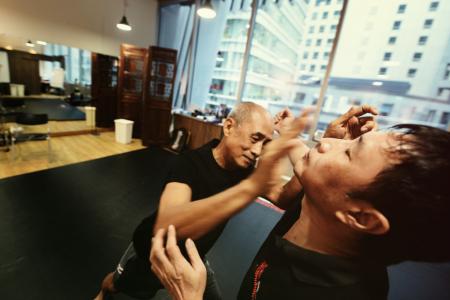In their 50s and older and they love martial arts
Martial arts isn't just for the young. Four men in their 50s and older tell VERNETTE CHIA (vchia@sph.com.sg) why they take lessons
His brother was killed in a violent attack in Malaysia and he was a mugging victim when he studied overseas.
These incidents prompted Mr Teo Yew Chye to start a martial arts school to promote public safety.
The 57-year-old says he still remembers the phone call in which he was told his brother had been attacked in Johor Baru in 2000.
His brother, Mr Teo Yew Chuan, then 46, had accidentally bumped into a stranger, but it turned into a heated argument.
When his brother walked away, the stranger and five other men chased after him with wooden poles.They hit him so hard, his skull was fractured and he died after remaining in a coma for seven years.
"I was more shocked and angry than sad when I heard the news. I was shocked that people could treat life with so much disdain," he says.
"It was then that I decided to do something about people getting victimised."

Mr Teo recounts how he was a victim of violent crime too and describes his eight years studying in Australia as traumatic.
He worked part-time as a dishwasher at several Asian restaurants and would leave the restaurants only at midnight.
STREET COMBAT
Mr Teo claims that on several occasions, he was set upon by strangers.
"It was racism. It wasn't because they knew me, it was because of my skin colour," he claims.
Even though he already had a black belt in taekwondo, he was not confident of his skills when he planned to open his martial arts school.
So for four years, he made trips to the US and Japan to learn street combat.
In 2005, Mr Teo opened Kapap Academy Singapore.It trains an average of 3,000 students a year.
He says: "If my brother had learnt self-defence, he could have survived.Kapap Academy Singapore plays the social mission of keeping people safe."
His 20-year-old daughter, who will be moving to Australia next year, also learns martial arts.
"I made her promise to learn. Asian women are usually petite and make easy targets," he says.
Mr Teo claims that many women at the academy have been assaulted before, but they do not report these cases as they usually feel embarrassed about it.
Although Singapore is relatively safe, Mr Teo maintains the importance of self-defence.
He says: "The problem in Singapore is that we've had decades of safety. We take our peace for granted."
Ready to defend himself

Mr Bernard Sim, 71, signed up for a self-defence class after reading about violent crimes against the elderly.
He joined the Modern Street Combatives class at Kapap Academy Singapore in 2010 and took lessons for two years. This specially crafted class is inspired by various self-defence systems such as Brazilian jiu jitsu, Kapap, Krav Maga, catch wrestling and weapon defence.
The grandfather of four says: "Robbers think the elderly are easy targets, because they have more money and are less likely to fight back."
Some may think he is being paranoid about getting attacked, but he says: "Even if nothing happens, it is a good exercise."
The former accountant, who holidays overseas at least twice a year, says the skills also protect him when he's away from home.
"Fortunately I have never been in a situation where I had to defend myself," he adds.
In his class, Mr Sim has fellow students as young as 17, but that does not intimidate him.
"They know I'm old so they will exercise care and avoid using full force on me," he says.
Younger sparring partners afraid of him

Mr Frank Tan picked up karate at 59. Now at 68, he has a third dan black belt.
Despite his age, the spry father of two daughters says karate is his passion.Even young sparring partners are afraid of him.
Three years ago, he started teaching students as young as 13 at Karate-Do Shinyuukai in King George's Avenue.
Mr Tan says some of the young students are excited and mischievous on their first day.
But when he starts the class, they quickly lose their smiles.
"I will make them run rounds and do push-ups when they are playful," he says.
"Sometimes when they are naughty, I will tell them sternly, 'This is not a playground, learn something before you play!'"
After a few lessons, Mr Tan says they learn the importance of respecting the martial arts and their instructors, and become more disciplined.
Over the years, he has injured his waist, and twisted his ankle and arm because of sparring. But the tough man continues to train.
"I abstain from classes for two to three weeks, but after that, I still carry on learning because karate is my passion," says Mr Tan.
He picked up martial arts at Karate-Do Shinyuukai after retiring from his job as a Singapore Airlines flight steward.
"I wanted to keep fit and learn a bit of self-defence. I saw that my friends were learning karate, so I decided to learn too," he says.
He trains for two hours, three times a week.
SAFE FOR ELDERLY
Karate-Do Shinyuukai owner Robert Tan, 57, known to his students as Shihan Tan, says he's glad to see his young students enjoy karate.
The karate coach with 36 years of teaching experience adds: "Most of the older trainees that I come across cite health, fitness and staying active as reasons for signing up.
"But there are some who say they do so because they missed out learning in their younger days."
Mr Tan believes that karate is suitable for all ages and is extremely safe for the elderly.
"If they are determined, picking up karate is as easy as putting on their karate uniform," he says.
When he started in 2007, Mr Frank Tan says he struggled.
"At first, my body was not used to the tough training, but after two weeks, it got better.
"Whether you are young or old, it's good to be fit and pick up an activity."
'I tell the younger students to slow down'

First karate, then muay thai, and now Kali, a form of martial arts from the Philippines.
Mr James Chan, a 64-year-old retiree, is a student at Trifecta Martial Arts in
Clemenceau Avenue and is one of the school's fittest students.
Mr Chan started learning Kali two months ago from instructors who fly in from the Philippines.
While his younger counterparts slow down during the lesson warm-up, which includes five minutes of skipping, he tirelessly maintains a steady pace.
He learnt karate in his late 20s, but at 58, decided to enhance his skills with other forms of martial arts.
"It's good to have an open mind, to explore other martial art forms," says Mr Chan, who used to work in the electronics industry.
"You'll realise that some kicks, punches and moves can be used in other forms of martial arts. The skills are interchangeable."
Mr Chan goes for lessons thrice weekly at Trifecta, where other students affectionately call him "Papa James".
Some students might think about holding back when sparring with him, but the agile fighter maintains that "there should be no compromise, no matter your age when it comes to sparring".
He adds: "The young ones are more rash and tend to retaliate immediately when you throw them a punch. But I think they should focus more on technique, and I usually tell them to slow down."
Learning martial arts at his age is more than about just keeping fit. It's also about confidence.
"I am not worried about being pushed around by others because I know I'm fit," says Mr Chan.
He says that people, including his instructors, find it hard to believe he's 64.
"Many think people my age walk around slowly, drink whiskey and hang around with their friends so they don't expect me to be doing muay thai," he says with a laugh.
Get The New Paper on your phone with the free TNP app. Download from the Apple App Store or Google Play Store now






